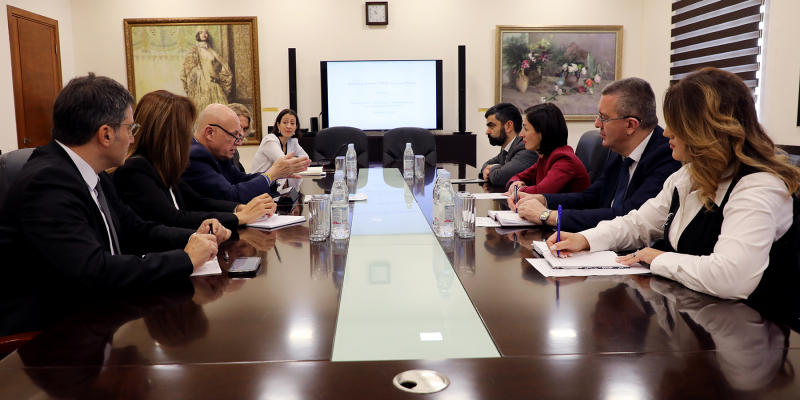Minister of Education, Science, Culture and Sports of the Republic of Armenia Zhanna Andreasyan received today the delegation headed by the World Bank Regional Director for Human Development in Europe and Central Asia Michal Rutkowski.
Country Manager of the World Bank for Armenia Carolin Geginat and Chairman of the Committee on Higher Education and Science Sargis Hayotsyan also attended the meeting.
Welcoming the guests, the ESCS Minister thanked the representatives of the World Bank for long-term, continuing and efficient collaboration. According to Zhanna Andreasyan, success in the education system is the result of joint efforts and work.
“Last year, the “RA Education Development State program until 2030” was approved, and currently we are in the stage of active reforms at all levels of education. Naturally, this requires a large amount of work, in which case professional assistance is essential. We have already carried out a lot of work with the World Bank also in terms of piloting and implementing the new state standard for general education. I am happy for the long-term cooperation we have. The sector of higher education is also joining our comprehensive reform agenda, where there remains much to be done,” said Zhanna Andreasyan.
Presenting the primary challenges facing the education system of the Republic of Armenia, the Minister also touched upon issues related to ensuring the right to education of about 30 thousand forcibly displaced students and schoolchildren from Nagorno-Karabakh, noting that the state places a high priority on children's involvement in educational institutions.
During the meeting, the parties referred to the plan for the creation of the Academic City.
According to the ESCS Minister, considerable infrastructure development should be carried out in these directions, in which the assistance of international partners will play a significant role.
Thankful for the reception, World Bank Regional Director for Human Development in Europe and Central Asia Michal Rutkowski highlighted that Armenia continues educational reforms in these hard times.
“The development of human capital is one of the priorities of the World Bank. We are confident that education reforms will directly contribute to the overall development of the country,” said Rutkovsky, reaffirming the World Bank's commitment to offer ongoing support and assistance.
Michal Rutkowski highly appreciated Armenia's efforts in the context of reforms in the field of education, piloting and implementation of the new state standard for general education, stressing that the results are impressive.
During the discussion, Senior Economist at the World Bank Renata Freitas Lemos presented the results of the evaluation of the STEM-related educational reforms carried out in Armenia. According to the monitoring, there has been a noticeable improvement in the quality of education in Tavush, the place where the state standard for general education was initially implemented. The research, according to World Bank experts, indicates that the complete implementation of the state standard for general education will have a favourable impact on advancing the quality of education.
According to representatives of the World Bank, the analysis shows that the full implementation of the state standard of general education will provide a positive result in terms of improving the quality of education
Further prospects of bilateral cooperation and other issues of interest were also considered during the meeting.









